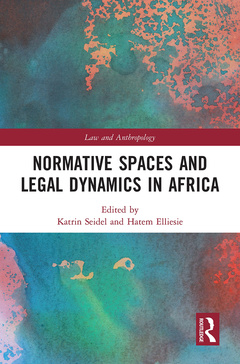Normative Spaces and Legal Dynamics in Africa Law and Anthropology Series
Coordonnateurs : Seidel Katrin, Elliesie Hatem

African legal realities reflect an intertwining of transnational, regional, and local normative frameworks, institutions, and practices that challenge the idea of the sovereign territorial state. This book analyses the novel constellations of governance actors and conditions under which they interact and compete. The work follows a spatial approach as the emphasis on normative spaces opens avenues to better understand power relations, processes of institutionalization, and the production of legitimacy and normativities themselves.
Selected case studies from thirteen African countries deliver new empirical data and grounded insights from, and into, particular normative spaces. The individual chapters explore the interrelationships between various normative orders, diverse actors, and their influences. The encounters between different normative understandings and actors open up space and multiple forums for negotiating values. The authors analyse how different doctrines, institutions, and practices are constructed, contested, negotiated, and adapted in translation processes and thereby continuously reshape Africa?s multidimensional normative spaces.
The volume delivers nuanced views of jurisprudence in Africa and presents an excellent resource for scholars and students of anthropology, legal geography, legal studies, sociology, political sciences, international relations, African studies, and anyone wishing to gain a better understanding of how legal constellations are shaped by unreflected assumptions about the state and the rule of law.
PROLOGUE Normative Spaces In Africa: Constructing, Contesting, Renegotiating, And Adapting Dynamics
Katrin Seidel And Hatem Elliesie
PART I constructing Normative Spaces
1 ‘Forensic Fetishism’ And Human Rights After Violent Conflict: Uncovering Somaliland’s Troubled Past
Markus Virgil Hoehne And Shakira Bedoya Sánchez
2 Transitional Justice Atmospheres: The Role Of Space And Affect In The International Criminal Court’s Outreach Efforts In Northern Uganda
Jonas Bens
3 The Libyan Constitution-Making Process: A Tool For State-Building In A Divided Socio-Normative Space?
Felix-Anselm Van Lier
PART II Contesting Normative Spaces
4 Challenges, Limits, And Prospects Of ‘Judicial Governance’ In Nigeria’s Political Translation (1999–2014)
Hakeem O Yusuf
5 Contesting Normative Spaces: The Status Of African Traditional Courts Under International Human Rights Law
Prosper Simbarashe Maguchu
6 Protecting Groups In Africa: Between International Law, National Law, And Local Customary Law
Julia Kriesel
PART III Re-Negotiating Normative Spaces
7 Mind The Gaps: Renegotiating South African Legal Pluralism Within The Post-Apartheid State
Olaf Zenker
8 Judicial Governance In Ghana: Negotiating Jurisdictional Authority In The Post-Colonial State
Tillmann Schneider
9 Living Customary Law In South Africa: Negotiating Spaces For Women In Traditional Communities
Lisa Heemann
PART IV Adapting Normative Spaces
10 The Legal Laboratory In Rwanda: Experimentalization And Adaptation
Stefanie Bognitz
11 Negotiated Outcomes In Low-Resourced Courts: Tanzania’s Land Courts System
Kelly Askew
12 Land Grabbing In Ethiopia: Questioning FDI And Big Government Projects
Daniel Behailu Gebreamanuel
13 Whither Courts? Forest Protection In Kenya: Case Of Mau Forest
Hannah W Wanderi
EPILOGUE Beyond A Linear Model Of Law In Space And Time
Anne Griffiths
Katrin Seidel is a research fellow in the Law and Anthropology Department of the Max Planck Institute for Social Anthropology, Germany, a former post-doctoral fellow at Käte Hamburger Kolleg, Centre for Global Cooperation Research, and the Academic Coordinator of the ‘RSF Hub’ (Joint Network Rule of Law support) at Freie Universität Berlin, in collaboration with the German Federal Foreign Office. Based on her interdisciplinary background in law and African/Asian studies, her research is situated at the intersection of legal pluralism, heterogeneous statehood, and governance.
Hatem Elliesie is a Max Planck Group Leader in the Law and Anthropology Department of the Max Planck Institute for Social Anthropology as well as member of the Executive Committee of the African Law Association in Germany. He earned his PhD at the Freie University in Berlin, with a dissertation dealing with Ethiopia’s and Eritrea’s related legal history, and holds a Magister Legum Europae (MLE) degree from Malta University and the University of Hannover.
Date de parution : 02-2022
15.6x23.4 cm
Date de parution : 06-2020
15.6x23.4 cm
Thèmes de Normative Spaces and Legal Dynamics in Africa :
Mots-clés :
Human Rights Violations Investigation Commission; Oputa Panel; Young Man; International Law; Public International Law; Dominic Ongwen; South Sudan; Mau Forest; UN; Customary Law; Official Customary Law; Legal Pluralism; Normative Spaces; Judicial Governance; Traditional Councils; Village Land Council; Banjul Charter; Transitional Justice; Large Scale Land Acquisitions; Large Scale Land Deals; Large Scale Land Investment; INEC; KFS; HRC General Comment; ICC Outreach



